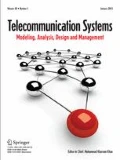Abstract
The problem of bandwidth allocation in wireless access networks is studied in this paper, investigating the performance of two approaches. Firstly, we use centralized algorithms, such as bankruptcy division rules and Nash bargaining. Secondly, a distributed algorithm is proposed in order to find the optimal solution of the bandwidth allocation problem. In both approaches, the allocation rules are properly modified to incorporate the influence of the channel state resulting in a more efficient and fair bandwidth allocation. The channel dependent centralized and distributed schemes are compared in terms of efficiency and fairness with a view to highlighting the advantages and disadvantages of every approach.
Similar content being viewed by others
References
Lee, B. G., Park, D., & Seo, H. (2009). Wireless communications resource management. Wiley/IEEE Press, New York.
Curiel, I., Maschler, M., & Tijs, S. H. (1987). Bankruptcy games. ZOR. Zeitschrift Für Operations-Research, 31, A143–A159.
Vassaki, S., Panagopoulos, A. D., & Constantinou, Ph. (2009). Bandwidth allocation in wireless access networks: bankruptcy game vs cooperative game. In: Workshop on mobile computing and networking technologies (WMCNT 2009), St. Petersburg, Russia.
Yang, S., & Hajek, B. (2007). VCG-Kelly mechanisms for allocation of divisible goods: adapting VCG mechanisms to one-dimensional signals. IEEE J. Selected Areas Communications 25(6), 1237–1243.
Niyato, D., & Hossain, E. (2006). Queue-aware uplink bandwidth allocation and rate control for polling service in IEEE 802.16 broadband wireless networks. IEEE Transactions on Mobile Computing 5(6), 668–679.
Niyato, D., & Hossain, E. (2006). A queueing-theoretic and optimization based model for radio resource management in IEEE 802.16 broadband wireless networks. IEEE Transactions on Computing 55(11), 1473–1488.
Niyato, D., & Hossain, E. (2007). QoS-aware bandwidth allocation and admission control in IEEE 802.16 broadband wireless access networks: a noncooperative game theoretic approach. Computer Networks 51(11), 3305–3321.
Niyato, D., & Hossain, E. (2006). A cooperative game framework for bandwidth allocation in 4G heterogeneous wireless networks. In Proc. of IEEE ICC.
Maille, P., & Tuffin, B. (2004). Multi-bid auctions for bandwidth allocation in communication networks. In: Proc. IEEE Infocom.
Lazar, A., & Semret, N. (1999). Design and analysis of the progressive second price auction for network bandwidth sharing. Telecommunication Systems. Special issue on Network Economics.
Kelly, F. P., Maulloo, A., & Tan, D. (1998). Rate control in communication networks: shadow prices, proportional fairness and stability. The Journal of the Operational Research Society 49, 237–252.
Johari, R., & Tsitsiklis, J. (2004). Efficiency loss in a network resource allocation game. Mathematics of Operations Research 29, 407–435.
Corless, R. M., Gonnet, G. H., Hare, D. E. G., & Jeffrey, D. J. (1993). Lambert’s W function in maple. Maple Technical Newsletter 9, 12–22.
Cao, Z., & Zegura, E. W. (1999). Utility max-min an application- oriented bandwidth allocation scheme. In: Proc. IEEE INFOCOM (Vol. 2, pp. 793–801).
Shenker, S. (19950. Fundamental design issues for the future Internet. IEEE Journal on Selected Areas in Communications 13(7), 1176–1188.
Thomson, W. (2003). Axiomatic and game-theoretic analysis of bankruptcy and taxation problems: a survey. Mathematical Social Sciences 45, 249–297.
Dagan, N., Serrano, R., & Volij, O. (1997). A non-cooperative view of consistent bankruptcy rules. Games and Economic Behavior, 18, 55–72.
Aumann, R., & Maschler, M. (1985). Game theoretic analysis of a bankruptcy problem from the Talmud. Journal of Economic Theory, 36, 195–213.
Chun, Y., Schummer, J., & Thomson, W. (2001). Constrained egalitarianism: a new solution to bankruptcy problems. Seoul Journal of Economics, 14, 269–297.
Nash, J. (1950). The bargaining problem. Econometrica, 18, 155–162.
Krishna, V. (2002). Auction theory. Academic Press, San Diego.
Ausubel, M. L., & Milgrom, P. (2006). The lovely but lonely Vickrey auction, combinatorial auctions, chapter 1. MIT Press, Cambridge.
Niyato, D., Hossain, E., & Han, Z. (2009). Dynamics of multiple-seller and multiple-buyer spectrum trading in cognitive radio networks: a game-theoretic modeling approach. IEEE Transactions On Mobile Computing 8, 1009–1022.
Saraydar, C., Mandayam, N. B., & Goodman, D. J. (2002). Efficient power control via pricing in wireless data networks. IEEE Transactions on Communications 50(2), 291–303.
Fontan, F. P., & Espieira, P. M. (2008). Modelling the wireless propagation channel: a simulation approach with Matlab. Wiley, New York.
Jain, R., Chiu, D., & Hawe, W. (1984) A quantitative measure of fairness and discrimination for resource allocation in shared computer system. DEC technical report 301.
Author information
Authors and Affiliations
Corresponding author
Rights and permissions
About this article
Cite this article
Vassaki, S., Panagopoulos, A.D. & Constantinou, P. Evaluation of channel dependent bandwidth allocation in wireless access networks: centralized and distributed approach. Telecommun Syst 52, 2003–2013 (2013). https://doi.org/10.1007/s11235-011-9481-9
Published:
Issue Date:
DOI: https://doi.org/10.1007/s11235-011-9481-9




